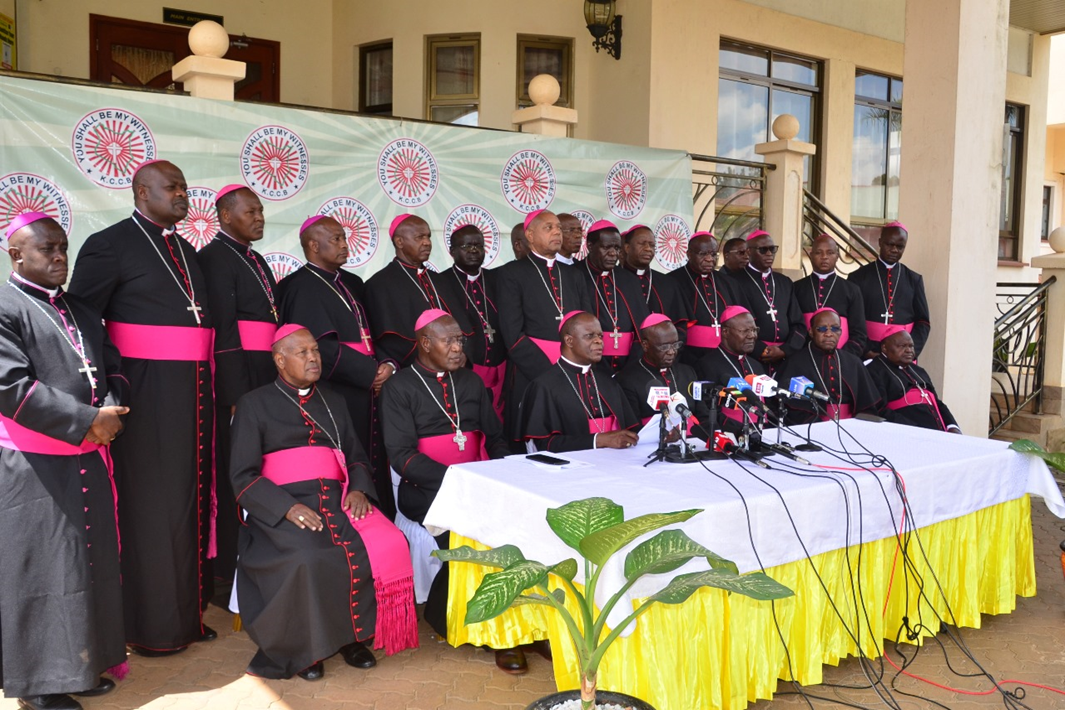By Paschal Norbert
NAIROBI, JUNE 25, 2025 (CISA)- The Kenya Conference of Catholic Bishops (KCCB) has strongly condemned the deepening erosion of human dignity in the country, decrying extra-judicial killings, the violent suppression of youth-led protests, cronyism in government, and the selective application of justice. In a strongly-worded statement issued on June 24, 2025, on the eve of the first anniversary of the June 25, 2024 protest killings, the bishops warned that these injustices point to a worsening national crisis.
Calling for a “fitting memorial” for young people killed during protests and urgent national renewal, the bishops urged the government to listen to its citizens, protect civic space, and uphold the sanctity of life.
The prelates delivered a sobering assessment of the state of the nation, warning that the country is drifting dangerously toward moral collapse due to escalating state brutality, youth suppression, systemic inequality, and governance failures. In their June 24 statement titled “Life is Sacred: Respect and Protect Human Life,” the bishops praised Kenyans for their resilience amid prolonged hardship but warned that true peace is impossible where justice is denied and lives are threatened.
“We commend the people of Kenya for their resilience and patience in the face of prolonged economic hardship, widespread unemployment, and rising social pressures,” the bishops said, acknowledging the strength and spirit of the nation. However, they cautioned that authentic peace must be built on justice and truth, not mere calm.
“Peace is not merely the absence of war… it is founded on truth, built up in justice, nurtured and animated by charity,” the statement read.
The bishops expressed grave concern over the growing devaluation of human life. They pointed to a series of mysterious disappearances and killings, including the deaths of Fr John Maina, Fr Allois Bett, Albert Ojwang, and others who perished under suspicious or violent circumstances. They were especially shocked by the recent point-blank shooting of Boniface Kariuki by a police officer.
“These are not merely names,” they stated, noting “They are brothers, sisters, priests, sons and daughters, and friends who deserved protection and justice.”
They decried the fact that security officers, who are sworn to protect, are becoming sources of fear and harm: “Kenya must stop at a loss of life and not ‘just move on.’ When a poor village boy violently loses his life it is just as tragic as when an important politician loses his. Kenyans must mourn both equally.”
On the issue of youth, the bishops were clear and empathetic. They acknowledged that the Gen Z-led protests which erupted a year ago were born of legitimate grievances about taxation, unemployment, and political exclusion.
“These youth-led demonstrations reminded us of the power of civic consciousness and the rightful place of young people in shaping the country’s direction,” the statement read.
While urging youth to protest peacefully and responsibly, the bishops condemned the harsh state response, including abductions, harassment, and in some cases, killings: “Our young people are not enemies of the State. They are citizens with valid concerns who should be heard and supported in building a better future for all.”
They called for justice for those murdered or injured during the protests and challenged security forces to avoid collaborating with violent groups to infiltrate peaceful demonstrations. “How can goons work together with the Police?” they asked. While condemning political opportunists who exploit tragedy for personal gain, the bishops also encouraged young people to maintain their peaceful and mature approach, even in the face of provocation.
The bishops turned a critical eye to the country’s development model, condemning the politicization of public resources. They described the current approach, marked by opaque handouts and favouritism, as a form of tokenism and cronyism that reduces development to a reward for political loyalty: “This practice has entrenched a culture of corruption and bribery, where proximity to power determines who receives services and who remains neglected.”
True development, they said, should be based on careful planning, equity, and service to all Kenyans, not selective generosity.
The bishops highlighted the selective application of the law as a grave threat to Kenya’s democracy. They noted how the poor, outspoken, and vulnerable are often targeted with swift and excessive enforcement, while the powerful enjoy protection and impunity. This, they said, undermines the credibility of legal institutions and fosters public resentment.
“Security forces have, in several documented cases, used excessive force against protestors, activists, and citizens seeking transparency,” they wrote, contrasting this with the slow prosecution of those implicated in corruption.
“Certain government operatives seem to operate above the law,” the bishops noted, warning that this imbalance risks breaking down the rule of law entirely.
In light of these serious concerns, the bishops made several calls to action. First, they demanded independent investigations into all reported cases of abductions, enforced disappearances, and extrajudicial killings.
“Those responsible should be held accountable in accordance with the law,” they emphasized, adding that the government must acknowledge that such deaths have occurred under its watch and take steps to uncover the truth.
They also called on all arms of government to uphold the Constitution and operate in accordance with principles of justice and human dignity. Oversight bodies like the Independent Police Oversight Authority (IPOA) and the Kenya National Commission on Human Rights (KNCHR), they said, must be empowered to work without interference.
“If the rule of law is undermined, we risk descending into anarchy and mob justice.”
On the protection of civic voices, the bishops affirmed that all Kenyans, including journalists, clergy, civil society, and especially the youth, must be free to speak without fear.
“Speaking truth to power is a service to the nation, not an act of rebellion,” they stated, condemning any threats against dissenters and called for a return to respectful public discourse.
“Governance by fear, threat, or intimidation must give way to empathetic, consultative and service-driven leadership,” they appealed, urging politicians to engage in constructive dialogue and to avoid playing political games with matters of life and death.
